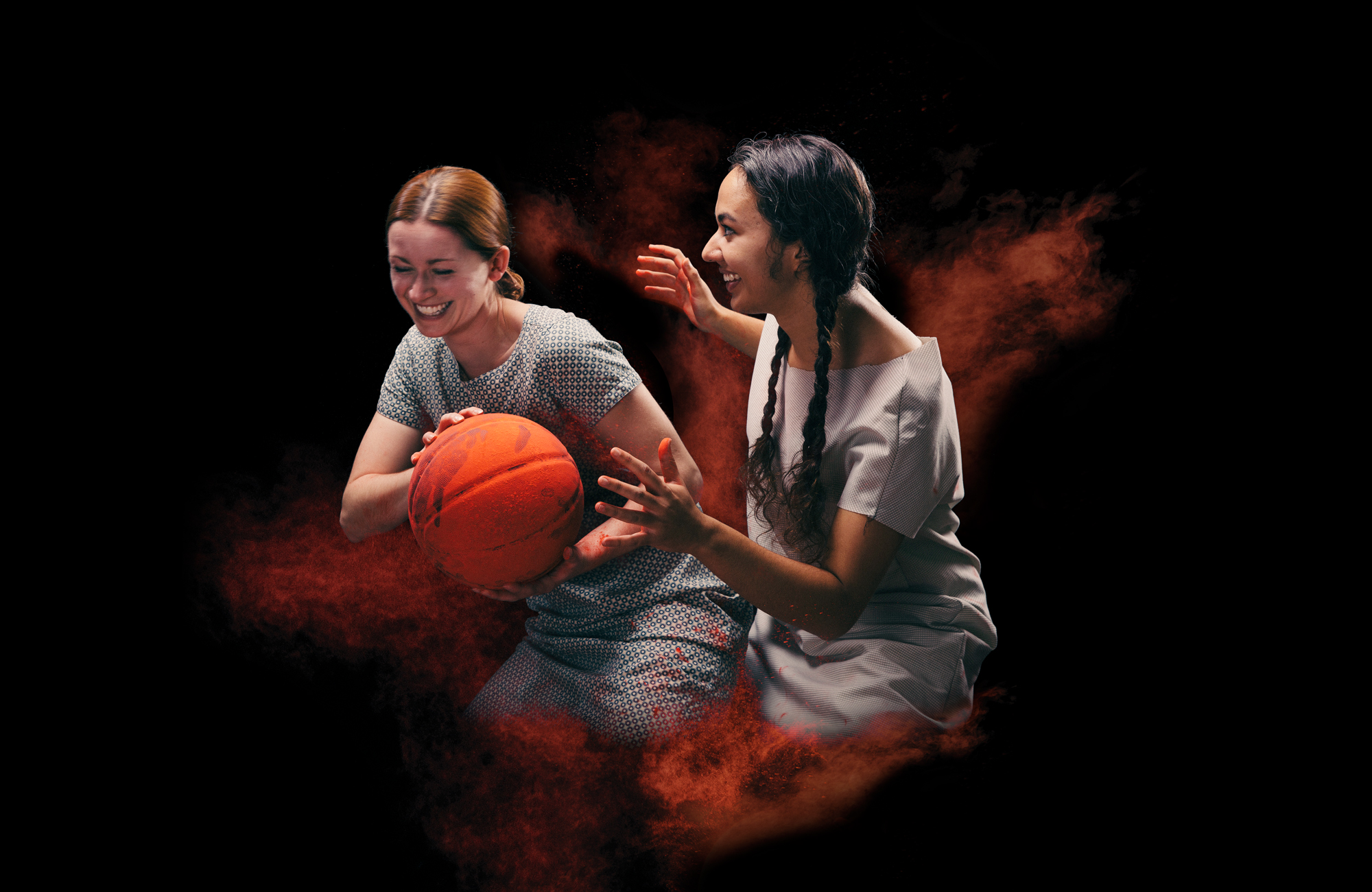Shattered Globe Theatre presents
THE TALL GIRLS
by Meg Miroshnik
directed by Lou Contey
playing January 12-February 25
at Theater Wit (1229 W Belmont, Chicago, IL)
History of Women’s Basketball in America
Adapted from A Timeline of Women’s Basketball History 1891 to Present, by Jone Johnson Lewis
1891
- James Naismith invented basketball at a Massachusetts YMCA school.
1892
- First women’s basketball team organized by Senda Berenson at Smith College, adapting Naismith’s rules to emphasize cooperation, with three zones and six players on each team.
1893
- First women’s college basketball game played at Smith College; no men were admitted to the game (March 21).
- Women’s basketball began at Iowa State College, Carleton College, Mount Holyoke College, and Sophie Newcomb College (Tulane) in New Orleans; each year more schools added women’s basketball to their sports offerings for girls.
1895
- Basketball was being played at many women’s colleges, including Vassar College, Bryn Mawr College, and Wellesley College.
1896
- Bloomers introduced as a playing costume at Sophie Newcomb College, New Orleans.
- Stanford and the University of California at Berkeley played the first women’s intercollegiate game; Stanford won, 2-1, and men were excluded, with women guarding the windows and doors to exclude men.
- First known women’s basketball game between two high schools was played in the Chicago area, with Chicago Austin High School against Oak Park High School.
1899
- Conference of Physical Training established a committee to form uniform rules for women’s basketball.
- Stanford banned women’s basketball from intercollegiate competition, as did the University of California.
1908
- AAU (Amateur Athletic Union) took the position that women or girls should not play basketball in public.
1914
- The American Olympic Committee declared its opposition to the participation of women in the Olympics competition.
1921
- Jeux Olympiques Féminines held in Monaco, an all-women’s sports competition for sports excluded from the Olympics; sports included basketball, track and field; Britain’s team won the basketball event.
1928
- Olympics included women’s basketball — as an exhibition event.
1931
- Golden Cyclones won AAU Championship, led by “Babe” Didrikson.
1930s
- Isadore Channels (of the Chicago Romas team) and Ora Mae Washington (of the Philadelphia Tribunes) were stars in two rival black women’s basketball barnstorming teams; both women were also American Tennis Association title winners.
- WDNAAF continued to pressure states to ban women’s basketball tournaments, with success in many states.
1940s
- During World War II, competition and recreational basketball was common; relocation centers for Japanese Americans, for instance, included regularly scheduled women’s basketball games.
1953
- International competition in women’s basketball was reorganized.
1955
- First Pan-American Games included women’s basketball; USA won the gold medal.
1969
- Women’s basketball was included in the Paralympics.
1972
- Title IX enacted, requiring federally-funded schools to fund women’s sports equitably, including teams, scholarships, recruitment, and media coverage.
- AAU established national basketball tournaments for girls younger than college age.
1976
- Women’s basketball became an Olympic sport; the Soviet team won the gold, USA won the silver.
1984
- Lynette Woodard began playing with the Harlem Globetrotters, the first woman to play with that team.
1985
- Senda Berenson Abbott, L. Margaret Wade, and Bertha F. Teague were inducted into the Naismith Memorial Basketball Hall of Fame, the first women to be so honored.
1988
- Olympic women’s basketball event won by USA team.
1999
- Women’s Basketball Hall of Fame opened with 25 inductees.
2000
- Olympics held in Sydney, Australia; USA team won the gold medal; Teresa Edwards became the first basketball player to play on five consecutive Olympic teams and win five Olympic medals.
2002
- Ashley McElhiney became the first woman head coach for a men’s professional basketball team (ABA, Nashville Rhythm); she resigned in 2005 with a 21-10 record.
The Tall Girls by Meg Miroshnik plays January 12th-February 25 at Theater Wit (1229 W Belmont, Chicago, IL). Single tickets are available via the Theater Wit Box Office. More info about Season Traveler Memberships–the best way to see all three shows in SGT’s 2016-2017 Season–are available here.

